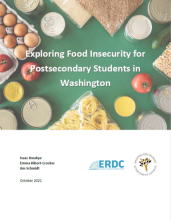Many students struggle to pay for the costs of living while they are in postsecondary education, and some even face food insecurity. Food insecurity may be detrimental to students’ academic performance, ability to persist and complete postsecondary programs, and their overall health and wellbeing. Addressing food insecurity may be an important aspect of improving Washington’s educational attainment and making postsecondary education more accessible and supportive for students of all social and economic backgrounds.
This report set out to examine food insecurity among postsecondary students in Washington using several data sources, including administrative data and survey data. Despite some evidence of declining food insecurity and public benefit receipt, data indicate that food insecurity is still a pressing issue for postsecondary students in Washington. Existing data may also not be comprehensive enough to identify all postsecondary students who are experiencing food insecurity. It is also likely that the COVID-19 crisis has added further challenges for students to access basic needs. Additional research should continue to assess the extent of food insecurity among postsecondary students in Washington and seek solutions to help students meet their basic needs so they can be successful in higher education.


